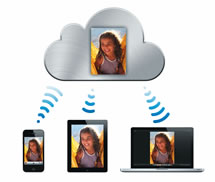
Apple CEO Steve Jobs re-emerged from his latest medical leave June 6 to show off the company’s latest innovations, which include a new cloud-based storage service that could make it easier to teach with digital materials downloaded from the iTunes or iBooks libraries.
Jobs was onstage for less than 30 minutes during a nearly two-hour event that primarily featured his subordinates. Ever the showman, he announced that the company had struck licensing agreements with all the major recording labels on a new music synching system.
Read more about cloud computing in higher education…
It will allow people to put all the songs they have ever bought from the company’s iTunes store on up to 10 devices at no additional charge.
Apple is offering to do the same thing with all books and applications previously purchased through its online stores.
All future iTunes purchases will be sent to all the devices automatically, too. None of the transfers will require devices to be plugged into a single computer. This will happen automatically over wireless connections.
“Keeping all those devices in sync is driving us crazy,” Jobs said.
Jobs’ keynote address at a conference for application developers marked his first onstage appearance since he unveiled the second version of Apple’s tablet computer, the iPad, three months ago.
It comes five months after Jobs went on his third medical leave of absence in the past seven years to deal with an unspecified medical issue. He has previously survived pancreatic cancer and undergone a liver transplant.
The new synching service that Jobs announced June 6 could be a boon for consumers, because more than 18 billion songs already have been bought through iTunes. It also could help make digital instruction with resources bought through Apple’s online stores easier. Apple said June 6 that more than 130 million digital copies of books have been downloaded from its store so far.
The new feature, allowing additional copies of previously purchased songs and books to be sent automatically to more devices, is available now.
It means that a teacher could buy one digital copy of a book or movie from Apple’s online store and have that resource appear on his or her computer, as well as up to nine other student devices at the same time.
Jobs also unveiled a way for most people to keep their entire music collections on the company’s computers without going through the time-consuming hassle of uploading each song over the internet.
The $25-per-year service, called iTunes Match, will allow people to play their personal jukeboxes on any device with iTunes software, instead of keeping them tethered to a personal computer that must be synced with other devices.
It’s aimed at people who have transferred their CD collections to the iTunes library on their own computers, but it also gives music labels a chance to be paid for pirated music. Apple is paying most of the iTunes Match revenue to the labels.
The music streaming is part of broader service, called iCloud, that represents Apple’s attempt to persuade the tens of millions of people who own iPhones, iPads, and iPod Touches to store documents, video, and photos in three data centers, including a recently completed one in rural North Carolina that cost more than $500 million.
The allure for consumers is to have all their digital content available on any device running Apple’s mobile software, called iOS.
For Apple, the iCloud service represents a response to similar storage services offered by Google Inc. and Amazon.com Inc.
Although those rivals have a head start, Apple is betting it can make the concept of online storage more appealing and convenient. iCloud replaces a failed syncing service called MobileMe, which Jobs said “was not our finest hour.”
It will take a few more months to find out if Apple is taking the next step in the evolution of digital music and internet storage. iTunes Match and most other iCloud features won’t be available until the fall, when Apple plans to release iOS 5.
Apple also announced it will release the next version of its operating system for Mac computers, called Lion, next month. A preview of that software program, which will cost $29.99, was handled by two other Apple executives.
Lion will give Apple a jump on Microsoft Corp., which recently said it won’t release the next version of its Windows operating system until next year.
Unlike during a six-month leave in 2009, Jobs, 56, hasn’t said when he is coming back to work.
The uncertainty makes his every appearance even more of a spectacle, because people don’t know if it will be the last time they will see one of the world’s most influential CEOs and cultural taste-makers.
Looking as frail as he did in his last appearance in March, Jobs didn’t discuss his health on June 6.
That wasn’t unusual; he has consistently treated his health as a personal matter and insisted that Apple’s board remain mum, too, much to the frustration of some shareholders who believe they deserve to know more about the condition of the man whose vision drives a company with a $312 billion market value.
That’s about $300 billion more than when Jobs, Apple’s co-founder, became the company’s CEO in 1997.
Apple, though, tried to strike an optimistic note by playing the James Brown song “I Feel Good” as a prelude to Jobs’ appearance. When the song concluded, Jobs stepped onstage to a standing ovation and a “We love you” shout from one man in the audience. Jobs smiled and said the warm reception “helps.”
While he was onstage, Jobs seemed animated as he gestured frequently and paced about the stage.
He appeared to walk up the steps of the stage slowly after sitting down in the audience a couple of times while other Apple executives demonstrated features of the iCloud service.
“He delivered all the key points, but it doesn’t look like he is getting any better,” said veteran Silicon Valley technology analyst Rob Enderle.
Tim Cook, Apple’s chief operating officer, has been running the company, just as he has through all of Jobs’ medical leaves. Jobs still has a say in major decisions.
- Extron AV Switching, Streaming, and Control Systems Aid Higher Learning at Idaho’s First Medical School - June 1, 2021
- Extron XTP, Streaming, and Control Systems Empower Point Park University’s Varsity Esports Program - June 1, 2021
- Extron NAV Series Delivers AVoIP Throughout Allied Health Veterans Hall at UNC Wilmington - June 1, 2021

